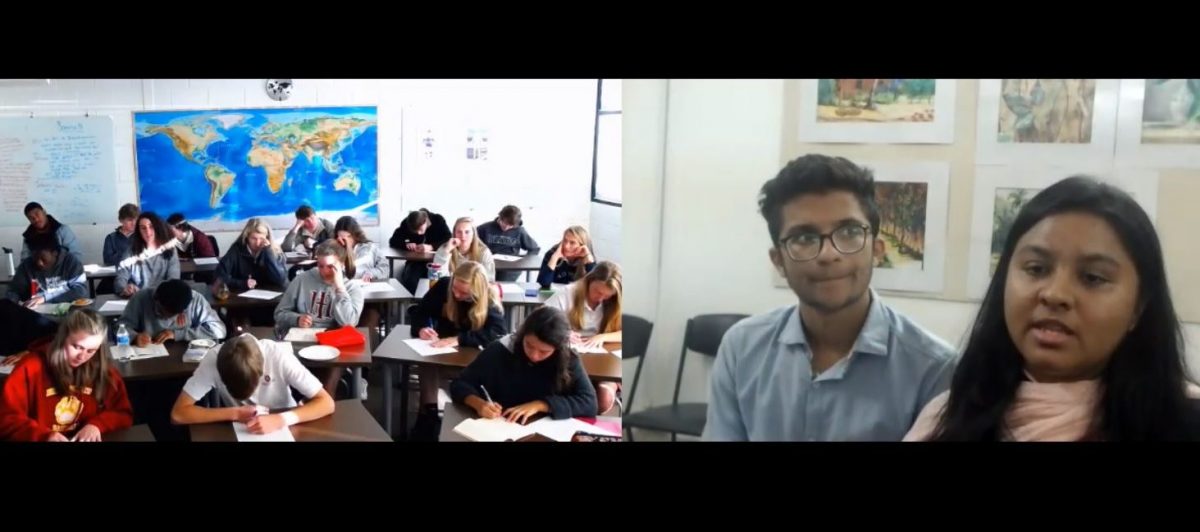Gaining perspective on the Rohingya crisis
Posted: 10 August 2018

Students from Holy Innocents’ Episcopal School in America held a video conference with representatives from Chittagong Grammar School in Bangladesh to learn more about the Rohingya crisis from the perspective of those living in Bangladesh.
Author and position: Zia Golam Mohiuddin, Round Square Representative, Senior Administrator, CIE Coordinator, MUN Coordinator
Schools: Chittagong Grammar School is a co-educational Day school serving over 3500 students across six campuses in Bangladesh. Holy Innocents’ Episcopal School is a college-preparatory day school in Atlanta, Georgia, United States for students ages 3 through 12th grade.
Introduction
The Rohingya are one of the many ethnic minority communities who once lived in the country of Myanmar (Burma). Over 700,000 people have fled the country following a period of continued persecution, a situation described by the United Nations as the “world’s fastest growing refugee crisis”. Most have fled to Bangladesh with an urgent need for provisions, safe drinking water, food, shelter and healthcare.
Students from Holy Innocents’ Episcopal School in America were eager to have an open discussion about this issue and share experiences and opinions from a domestic and international perspective. The discussion was facilitated by the Assistant Director of Global Studies and acted as an introduction to a Global Citizenship & International Relations class.
Planning
The video call was scheduled for October 25, 2017. Students from Holy Innocents’ Episcopal School submitted questions in advance of the call.
Activity
The discussion took place via Zoom. 22 students from Holy Innocents’ Episcopal School participated and addressed questions to Faizah Ibnat, leader of the Chittagong Grammar School Alumni team for the Rohingya aid project, and Salman Sattar, the school’s Round Square Student Chair.
The questions included:
- How does the Rohingya crisis personally affect you?
- How has the Rohingya crisis affected your community?
- How is it affecting the lives of everyday citizens in Bangladesh?
- What do you believe your government should do with the influx of refugees? Do you believe they’re doing the right things?
- Are the Rohingya people socially accepted or denied in your particular community? If not, why?
- Due to the population density of Bangladesh, how do people feel about accommodating more refugees?
- What is the general Bangladeshi citizen attitude towards the Rohingya refugees? Does the average Bangladeshi citizen hold a pro or anti refugee stance?
- Do you think the government should be doing something about this crisis?
- How should the international community help you?
- Have you seen any changes because of the Rohingya Crisis?
- Is there anything you can do to help them? Do you feel like you should help them?
- What are the students taught about the Rohingya?
- Why do you feel responsible for accommodating refugees?
- Do you think that your government should get involved with the Rohingya situation?
- Do you think that Bangladesh should limit the number of refugees who come in?
- Do you feel like there is enough aid being rendered towards the Rohingya child refugees and their families?
- What sort of communication do the Rohingya people have with the international community?
- What discrimination against the Rohingya Muslims have you seen in Bangladesh?
- Do you feel it’s Bangladesh’s right/duty, as well as the citizens of Bangladesh, to stand up and speak up for the Rohingya against the Myanmar government?
- What do you wish the rest of the world would understand about the Bangladesh situation?
- Do people understand the full extent to which the Rohingya people are persecuted in your community? Does everyone know the FULL story?
- What do you think is a realistic outcome for this crisis?
Challenges
There were no challenges with this activity.
Impact
The benefit to Chittagong Grammar School was huge. It put the spotlight on a project led by our alumni, working alongside the school administration, teachers, students and parents, to raise awareness and aid for the Rohingya refugees in Bangladesh. This project was led by Faizah Ibnat who was very happy to share her thoughts and honest insight with the Holy Innocents’ students. These have been helpful for the students to start their own method of protest and service for the refugees.
Following the Zoom call, Holy Innocents’ students continued to discuss the suffering of the Rohingya, the strains on Bangladesh, and ways they could respond with action. The Assistant Director of Global Studies wanted the students to come up with their own ideas of ways to respond. Although they were unable to initiate a fundraising campaign on such short notice (a school policy), the students came up with other ways to engage.
They had read that the U.S. government has not yet formally declared the violence in Myanmar as genocide, a declaration that would result in legal consequences the US government would be required to take against Myanmar. It transpired that several of their students’ families had connections to senators—one of them is the neighbor of a student!
The students developed information to share with other students and invited their support for a petition to categorise the situation as ‘genocide’. This included a video made by an 11th grade Global student: https://youtu.be/UcC5HIjhbqc
A day of signature collections during lunch garnered 405 signatures from upper school students and faculty and the resulting petition was delivered to Johnny Isakson, one of Georgia’s two U.S. Senators.
An online petition was also created at Change.org (this was spontaneously created by one student):http://bit.ly/congressstopgenocide
The Assistant Director of Global Studies has said: “I think the biggest immediate outcome for students was to confront the facts surrounding this crisis, in the context of both other historical human rights crises and genocides as well as our currently raging debate over refugees and asylum seekers. Our students also saw that awareness must lead to action, and that action as a citizen is inherently political. As soon-to-be-voters, I think they will carry this experience with them to the ballot box and, for some, to careers in public service.”
The video chat in particular humanized an otherwise distant crisis. The programming in advisory that the students created gave them the opportunity to look beyond a foreign-sounding word in the headlines to consider the very real human suffering behind it.
The Future
The schools expect to collaborate again in the future.
Advice
- Go ahead and do it! We would strongly advise other schools to organize similar initiatives as it provides real insight and helps raise awareness of these issues.
- It can also assist in organising and synchronizing service projects.
- Finally, it creates bonding between people of different backgrounds.
